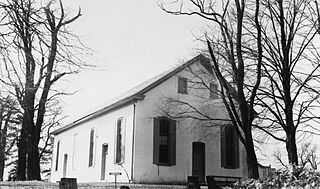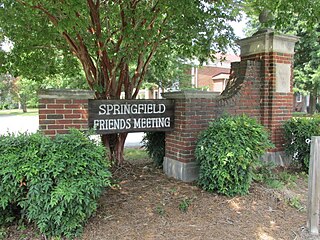Related Research Articles
Friends United Meeting (FUM) is an association of twenty-six yearly meetings of the Religious Society of Friends (Quakers) in North America, Africa, and the Caribbean. Its home pages states that it is "a collection of Christ-centered Quakers, embracing 34 yearly meetings and associations, thousands of local gatherings and hundreds of thousands of individuals". In addition there are several individual monthly meetings and organizations that are members of FUM; FUM's headquarters is in Richmond, Indiana, with offices in Kisumu, Kenya. Friends United Meeting is a member of the National Council of Churches in the United States of America.
The views of Quakers around the world towards homosexuality encompass a range from complete celebration and the practice of same-sex marriage, to the view that homosexuality is sinfully deviant and contrary to God's intentions for sexual expression. The Religious Society of Friends (Quakers) is a historically Christian religious movement founded in 17th-century England; it has around 350,000 members. In Britain, Canada, New Zealand and Australia, many Quakers are supportive of homosexual relationships, while views are divided among U.S. meetings. Some Conservative Friends and Holiness Friends, both of which have retained traditional Quaker practices such as plain dress, along with Evangelical Friends, view homosexual acts as sinful. The majority (52%) of Quakers live in Africa, and though views may differ, the Kenyan Church of Friends does not support homosexual relationships.

Earlham College is a private liberal arts college in Richmond, Indiana. The college was established in 1847 by the Religious Society of Friends (Quakers) and has a strong focus on Quaker values such as integrity, a commitment to peace and social justice, mutual respect, and community decision-making. It offers a Master of Arts in Teaching and has an affiliated graduate seminary, the Earlham School of Religion, which offers three master's degrees: Master of Divinity, Master of Ministry, and Master of Arts in Religion.
Thomas Raymond Kelly was an American Quaker educator. He taught and wrote on the subject of mysticism. His books are widely read, especially by people interested in spirituality.
Evangelical Friends Church International (EFCI) is a branch of Quaker yearly meetings located around the world.

The Religious Society of Friends began as a proto-evangelical Christian movement in England in the mid-17th century in Ulverston. Members are informally known as Quakers, as they were said "to tremble in the way of the Lord". The movement in its early days faced strong opposition and persecution, but it continued to expand across the British Isles and then in the Americas and Africa.

Yearly Meeting is an organization composed of constituent meetings or churches of the Religious Society of Friends, or Quakers, within a geographical area. The constituent meetings are called Monthly Meetings in most of the world; in England, local congregations are now called Area Meetings, in Australia Monthly Meetings are called Regional Meetings. "Monthly" and "Yearly" refer to how often the body meets to make decisions. Monthly Meetings may be local congregations that hold regular Meetings for Worship, or may comprise a number of Worship Groups. Depending on the Yearly Meeting organization, there may also be Quarterly Meetings, Half-Yearly Meetings, or Regional Meetings, where a number of local Monthly Meetings come together within a Yearly Meeting.
Conservative Friends are members of a certain branch of the Religious Society of Friends (Quakers). In the United States of America, Conservative Friends belong to three Yearly Meetings, Ohio, North Carolina, and Iowa. English Friends affiliated with the Conservative branch tend to use the term Primitive, or Plain. There is no single unifying association of Conservative Friends, unlike three of the other branches of Quakerism in America, represented by Friends United Meeting, Evangelical Friends International, and Friends General Conference.

Earlham School of Religion (ESR), a graduate division of Earlham College, located in Richmond, Indiana, is the oldest graduate seminary associated with the Religious Society of Friends (Quakers). ESR's Mission Statement is as follows: "Rooted in the Christian Quaker tradition of contemplation that inspires action, Earlham School of Religion prepares theologically diverse students for a pluralistic world. Our curriculum unites spiritual formation, academic study, social engagement, and vital ministry."
The Richmond Declaration was made by 95 Quakers in September 1887, at a conference in Richmond, Indiana. It was a declaration of faith, and although Quakers do not have a dogma or creed, the Richmond Declaration has been used as a standard by certain groups of Quakers, mainly Orthodox and Evangelical, ever since. The Declaration was "approved," "accepted," or "adopted" by the Orthodox Yearly Meetings of Indiana, Western, New England, New York, Baltimore, North Carolina, Iowa, and Canada. Among Orthodox Friends in North America, only Ohio and Philadelphia yearly meetings did not so act. The Friends United Meeting General Board reaffirmed the declaration as a statement of faith in February 2007. The Declaration appears in most books of discipline of Evangelical and Friends United Meeting yearly meetings.

Ohio Valley Yearly Meeting is a Yearly Meeting of the Religious Society of Friends (Quakers). It is one of the seven bodies that represent the five different branches of the Society of Friends in Ohio.

Quakers are people who belong to the Religious Society of Friends, a historically Protestant Christian set of denominations. Members of these movements are generally united by a belief in each human's ability to be guided by the inward light, "answering that of God in every one". Friends have traditionally professed a priesthood of all believers inspired by the First Epistle of Peter. They include those with evangelical, holiness, liberal, and traditional Quaker understandings of Christianity, as well as Nontheist Quakers. To differing extents, the Friends avoid creeds and hierarchical structures. In 2017, there were an estimated 377,557 adult Quakers, 49% of them in Africa.
A Book of Discipline may refer to one of the various books issued by a Yearly Meeting of the Religious Society of Friends, setting out what it means to be a Quaker in that Yearly Meeting. The common name for this book varies from one Yearly Meeting to another and includes Book of Discipline, Faith and Practice, Christian Faith and Practice, Quaker Faith and Practice, Church Government and Handbook of Practice and Procedure. Each Book of Discipline is updated periodically by each Yearly Meeting according to the usual practice of decision making within the Religious Society of Friends.

Olney Friends School is a small, co-educational boarding and day school affiliated with the Religious Society of Friends (Quakers). Located in the foothills of the Appalachian Mountains in Barnesville, Ohio, the school "challenges students to grow, celebrates intellectual vigor, provokes questions of conscience, and nurtures skills for living in community." Students come from around Ohio, around the country, and around the world to study the college prep curriculum. Currently (2017-2018), the school is attended by 53 students from 14 US states and 10 countries.
Gurneyite is a term assigned to certain members of the Religious Society of Friends, or Quakers. The name originates because of the sympathy of the views of these Friends with the ideas of Joseph John Gurney, an English Quaker minister. In general, Gurneyite Quakers follow evangelical Christian doctrines on Jesus Christ, the Atonement, and the Bible. Orthodox Quakers separated into Gurneyites and Wilburites, beginning in the 1840s in North America. The Richmond Declaration (1887) is a confession of faith upheld by Gurneyite Quakers.
The New Association of Friends is a Friends (Quaker) organization in the US.

Esther Pugh was an American temperance reformer of the long nineteenth century. She served as Treasurer of the National Woman's Christian Temperance Union (WCTU), a Trustee of Earlham College, as well as editor and publisher of the monthly temperance journal, Our Union.

Springfield Friends Meeting is an historic Quaker meeting located in High Point, North Carolina.
The Progressive Friends, also known as the Congregational Friends and the Friends of Human Progress, was a loose-knit group of dissidents who left the Hicksite branch of the Society of Friends (Quakers) in the mid-nineteenth century. The separation was caused by the determination of some Quakers to participate in the social reform movements of the day despite efforts by leading Quaker bodies to dissuade them from mixing with non-Quakers. These reformers were drawn especially to organizations that opposed slavery, but also to those that campaigned for women's rights. The new organizations were structured according to congregationalist polity, a type of organization that gives a large degree of autonomy to local congregations. They were organized on a local and regional basis without the presence of a national organization. They did not see themselves as creators of a new religious sect but of a reform movement that was open to people of all religious beliefs.
References
- 1 2 Official website
- ↑ "A Great and Good People: Midwestern Quakers and the Struggle Against Slavery" by Thomas D. Hamm, April Beckman, Marissa Florio, Kirsti Giles, and Marie Hopper, Indiana Magazine of History Vol. 100, No. 1, March 2004
- ↑ "Campus and History". Earlham.edu. Retrieved 2021-05-20.
- ↑ Angell, Stephen W.; Dandelion, Pink (26 September 2013). The Oxford Handbook of Quaker Studies. Oxford University Press. p. 99. ISBN 978-0-19-166735-0.
- ↑ Friends World Committee for Consultation website, statement on reason for New Association
- ↑ Quaker Theology website